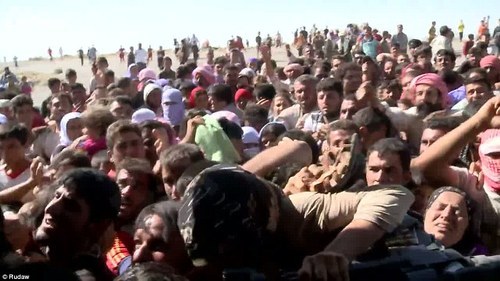Yazidi refugees and Kurdish officials warned of a continued humanitarian disaster, even as President Barack Obama on Thursday hailed the success of U.S. efforts to stop the jihadist advance on Mount Sinjar, in a high-stakes disagreement over a crisis that drew Washington toward military action.
In televised remarks, Mr. Obama said U.S. airstrikes on the Islamic State militants, also known as ISIL, had broken what he called their siege of Mount Sinjar, where tens of thousands of people had been trapped without adequate food or water.
"The situation on the mountain has greatly improved," Mr. Obama said, due to U.S. airdrops of supplies, which he signaled would be halted.
 |
| Displaced people from the Yazidi religious minority being evacuated by members of the Kurdish People's Protection Units to Syria on Wednesday. Reuters |
His announcement came after a U.S. assessment team, which spent nearly 24 hours on the mountain, concluded on Wednesday that a large number of the trapped members of Iraq's Yazidi religious minority had already managed to flee. That made it unlikely that the U.S. would carry out a risky evacuation, as had been considered.
"We helped vulnerable people reach safety and we helped save many innocent lives," the president said.
But Kurdish officials and dozens of refugees who have fled the mountain paint a different picture.
For days, Yazidi refugees have recounted stories of family members still trapped and voiced fears of a genocide for the thousands they said were left behind.
On Thursday, hundreds of refugees were still streaming into Dohuk over a river crossing from Syria, although border officials said their number had dropped sharply.
 |
| CLICK MAP to ENLARGE |
"There are many thousands still there spread across a huge area. They're dying from the lack of food and the heat. The situation hasn't finished, it is now reaching a more critical point," said Ayad Hero, a 22-year-old who arrived in Iraq on Thursday with 11 of his family.
Kurdish officials poured skepticism on the U.S. assessment: "How much can a small team of people see in a mountain that is 64 kilometers [40 miles] wide? There are valleys and caves where people are living," said Shawkat Othman, a director for Dohuk city in the northern province of Dohuk, where tens of thousands of displaced Iraqis have sought refuge.Read the rest of the story HERE and view a related video below:
If you like what you see, please "Like" us on Facebook either here or here. Please follow us on Twitter here.




No comments:
Post a Comment